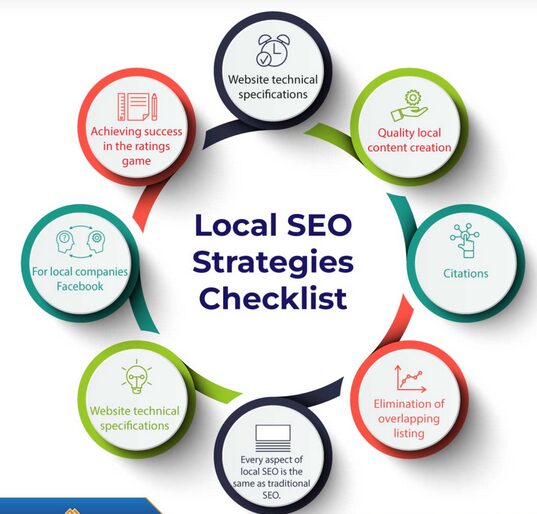What is local SEO?
Local SEO is a specialized branch of search engine optimization that focuses on optimizing a business’s online presence to attract more local customers. It involves tailoring your digital marketing strategies to enhance visibility in local search results, ultimately connecting businesses with nearby consumers actively seeking their products or services.
Why is local SEO important?
Local SEO is super important because it makes sure that when people nearby are searching for things to buy or services they need, local businesses show up in the search results. This helps businesses be seen more, trusted more, and liked more in their local area.
For regular stores, it means more people coming in to buy things, and for online shops, it means more people buying things from their websites. So, using local SEO is like making sure lots of people know about your business close by, and that can make your shop busier and your online sales go up!
What does a local search look like?
A local search typically involves users seeking products or services available in their immediate geographic area. For instance, a user might search for “best coffee shops near me” or “plumbers in city.” Local searches often include location-specific qualifiers, and search engines aim to provide the most relevant and geographically proximate results.

How Google Determines Local Search Rankings
Google uses a complex algorithm to determine local search rankings. The algorithm considers factors such as
Relevance
Relevance in the context of local search refers to how well a business’s online presence aligns with a user’s search intent. Search engines aim to deliver results that are most pertinent to what the user is actively seeking. To enhance relevance, businesses must optimize their online profiles, website content, and keywords to accurately reflect the products or services they offer.
This includes using location-specific keywords and providing detailed information about the business, ensuring that search engines can confidently match the business with relevant search queries.
For example, if a user searches for “Italian restaurants near me,” search engines will prioritize restaurants with online profiles and content that explicitly emphasize their relevance to Italian cuisine and proximity to the user’s location.
Proximity
How close a business is to you matters a lot when you’re searching for things nearby. Search engines, like Google, think about how close a shop or company is to where you are when they show search results. This closeness is a big deal in deciding which businesses appear first in local searches.
So, when you’re looking for something close by, the search engine tries to show you places that are not too far away. This means that businesses physically closer to the user may appear higher in the results.
Making sure your business information, like your address, is correct everywhere online is what we mean by optimizing for proximity. This is really important for stores with a physical location because it helps local customers find them easily. So, if you have a shop, you want to make sure that your address is right on all the websites and apps so people can easily come to your store.
Prominence
Prominence, in the context of local search, assesses the credibility, popularity, and visibility of a business. Search engines consider factors such as online reviews, ratings, backlinks, and overall online presence to determine the prominence of a business. A business with a robust online reputation is more likely to be deemed prominent in local search rankings.
Encouraging and managing positive online reviews, maintaining an active and accurate Google My Business (GMB) profile, and securing backlinks from reputable local sources contribute to the prominence of a business. Essentially, prominence reflects how well a business stands out in the digital landscape, influencing its position in local search results.
In summary, relevance ensures that a business’s online information aligns with user intent, proximity considers the physical distance to the user, and prominence evaluates the credibility and visibility of the business online. Understanding and optimizing for these factors are essential steps for businesses aiming to improve their visibility in local search results and attract customers in their geographic area
The 10 Benefits of Local SEO
- Enhanced Visibility in Local Searches: Local SEO ensures your business appears prominently when local customers search for the products or services you offer.
- Boosting Traffic and Conversions: Optimizing for local search terms attracts high-intent traffic, increasing foot traffic and online conversions.
- Building Trust and Credibility: Consistent visibility in local searches establishes trust with your audience, especially with positive online reviews.
- Mobile Optimization and Local Searches: Local SEO ensures your website is mobile-friendly, catering to users who rely on smartphones for local searches.
- Competing Effectively Against Larger Competitors : Local SEO levels the playing field, giving smaller businesses a chance to shine in local searches.
- Targeting Local Niches and Markets : Local SEO allows businesses to tailor their strategies to specific local niches, attracting the right audience.
- Cost-Effective Marketing Strategy : Compared to traditional advertising, investing in local SEO offers a cost-effective approach with a high ROI.
- Data-Driven Insights for Business Growth: Local SEO tools provide valuable insights, aiding informed decisions for sustained business growth
- Community Engagement and Local Branding : Local SEO fosters community engagement, positioning your brand positively within the local community.
- Adaptability to Evolving Consumer Behavior: A well-executed local SEO strategy ensures businesses stay adaptable to changes in consumer behavior and search trends.
How to Optimize Your Site for Local Search: 6 Local SEO Tips
Optimize Google My Business (GMB)
Ensure your GMB profile is complete and accurate, including business hours, location, and contact information.
Use Local Keywords
Incorporate location-specific keywords naturally into your website’s content, meta tags, and headings.
Earn Positive Reviews
Encourage satisfied customers to leave positive reviews, as they contribute to your business’s prominence and credibility.
Create Local Content
Develop content that is relevant to your local audience, addressing their specific needs and interests.
Local Link Building
Build local backlinks from reputable sources, enhancing your business’s prominence in local search results.
Mobile Optimization
Ensure your website is mobile-friendly to cater to users conducting local searches on their smartphones.
Conclusion
In conclusion, the importance of local SEO for businesses cannot be overstated. It is a dynamic and essential component of a comprehensive digital marketing strategy, offering tangible benefits such as increased visibility, enhanced credibility, and targeted audience engagement. As consumers increasingly rely on online searches to inform their purchasing decisions, businesses that prioritize local SEO position themselves for sustained success in the competitive and ever-evolving digital landscape.
